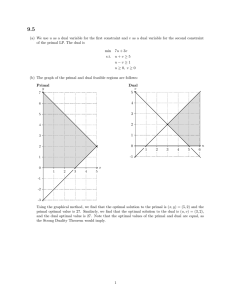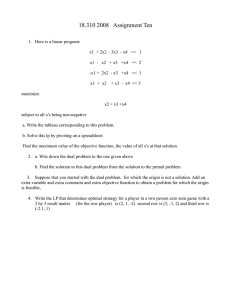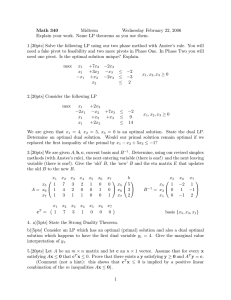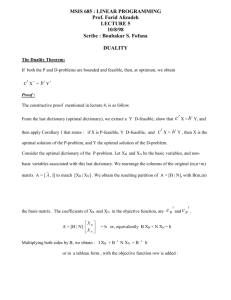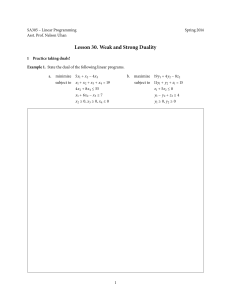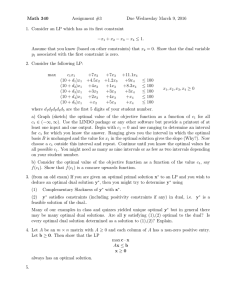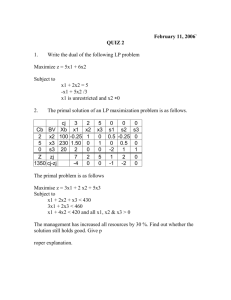Today: − Linear Programming (con’t.) COSC 581, Algorithms April 10, 2014
advertisement
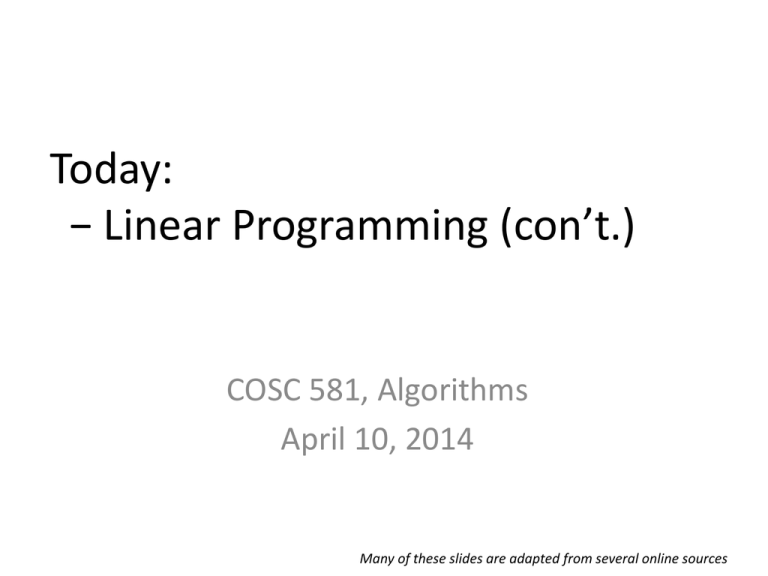
Today: − Linear Programming (con’t.) COSC 581, Algorithms April 10, 2014 Many of these slides are adapted from several online sources Reading Assignments • Today’s class: – Chapter 29.4 • Reading assignment for next class: – Chapter 9.3 (Selection in Linear Time) – Chapter 34 (NP Completeness) Optimality of SIMPLEX • Duality is a way to prove that a solution is optimal • Max-Flow, Min-Cut is an example of duality • Duality: given a maximization problem, we define a related minimization problem s.t. the two problems have the same optimal objective value Duality in LP • Given an LP, we’ll show how to formulate a dual LP in which the objective is to minimize, and whose optimal value is identical to that of the original LP (now called primal LP) Primal Dual LPs: Primal: maximize cT x subject to: Ax ≤ b x≥0 (standard form) Dual: minimize yT b subject to: yT A ≥ cT y≥0 (standard form) xT n y A cT d b Forming dual • Change maximization to minimization • Exchange roles of coefficients on RHSs and the objective function • Replace each ≤ with ≥ • Each of the m constraints in primal has associated variable 𝑦𝑖 in the dual • Each of the n constraints in the dual as associated variable 𝑥𝑖 in the primal Example : Primal-Dual PRIMAL: max 16 x1 - 23 x2 + 43 x3 + 82 x4 subject to: 3 x1 + 6 x2 -9 x1 + 8 x2 5 x1 + 12 x2 x1≥0, DUAL: - 9 x3 + 4 x4 + 17 x3 - 14 x4 + 21 x3 + 26 x4 x2≤0, x4≥0 min 239 y1 + 582 y2 - 364 y3 subject to: 3 y1 6 y1 -9 y1 4 y1 - 9 y2 + 5 y3 + 8 y2 + 12 y3 + 17 y2 + 21 y3 - 14 y2 + 26 y3 y1≥0, y3≤0 ≥ ≤ = ≥ 16 -23 43 82 ≤ 239 = 582 ≥ -364 Think about bounding optimal solution… Is optimal solution ≤ 30? Yes, consider (2,1,3) Think about bounding optimal solution… Is optimal solution ≥ 5? Yes, because x3 ≥ 1. Is optimal solution ≥ 16? Yes, because 6x1 + x2 +2x3 ≥ 16. Is optimal solution ≥ 6? Yes, because 5x1 + x2 ≥ 6. Strategy for bounding solution? What is the strategy we’re using to prove lower bounds? Take a linear combination of constraints! Strategy for bounding solution? 5 Don’t reverse inequalities. What’s the objective?? Optimal solution = 26 To maximize the lower bound. Note: Use of primal as minimization • Just to show you something a bit different from the text, the following discussion assumes the primal is a minimization problem, and thus the dual is a maximization problem • Doesn’t change the meaning (compared to text) Primal-Dual Programs Primal Program Dual solutions Dual Program Primal solutions Primal Weak Duality Theorem If x and y are feasible primal and dual solutions, then any solution to the primal has a value no less than any feasible solution to dual. Proof Dual Primal Dual Programs Dual Program Primal Program Primal solutions Dual solutions Von Neumann [1947] Primal optimal = Dual optimal Dual solutions Primal solutions Strong Duality – Prove that if primal solution = dual solution, then the solution is optimal for both PROVE: Farka’s Lemma • Exactly one of the following is solvable: and: where: 𝐴𝐴 ≤ 0 𝑐T𝑥 > 0 𝐴T 𝑦 = 𝑐 𝑦≥0 – x and c are n-vectors – y is an m-vector – A is m×n matrix Fundamental Theorem on Linear Inequalities Proof of Fundamental Theorem Strong Duality PROVE: In other words, the optimal value for the primal is the optimal value for the dual. Example Objective: max 2 1 -2 -1 1 2 Example Objective: max 2 1 -2 -1 1 2 Geometric Intuition 2 1 -2 -1 1 2 23 Geometric Intuition Intuition: There exist nonnegative y1 , y2 so that The vector c can be generated by a1, a2. Y = (y1, y2) is the dual optimal solution! Strong Duality Intuition: There exist y1 , y2 so that Y = (y1, y2) is the dual optimal solution! Primal optimal value Here’s another analogy: 2 Player Game Column player 0 Row player -1 1 1 0 -1 -1 1 0 Strategy: A probability distribution Row player tries to maximize the payoff, column player tries to minimize 2 Player Game Column player Strategy: A probability distribution Row player A(i,j) Is it fair?? You have to decide your strategy first. Von Neumann Minimax Theorem Strategy set Which player decides first doesn’t matter! Key Observation If the row player fixes his strategy, then we can assume that y chooses a pure strategy Vertex solution is of the form (0,0,…,1,…0), i.e. a pure strategy Key Observation similarly Primal-Dual Programs duality Reading Assignments • Reading assignment for next class: – Chapter 9.3 (Selection in Linear Time) – Chapter 34 (NP Completeness)
